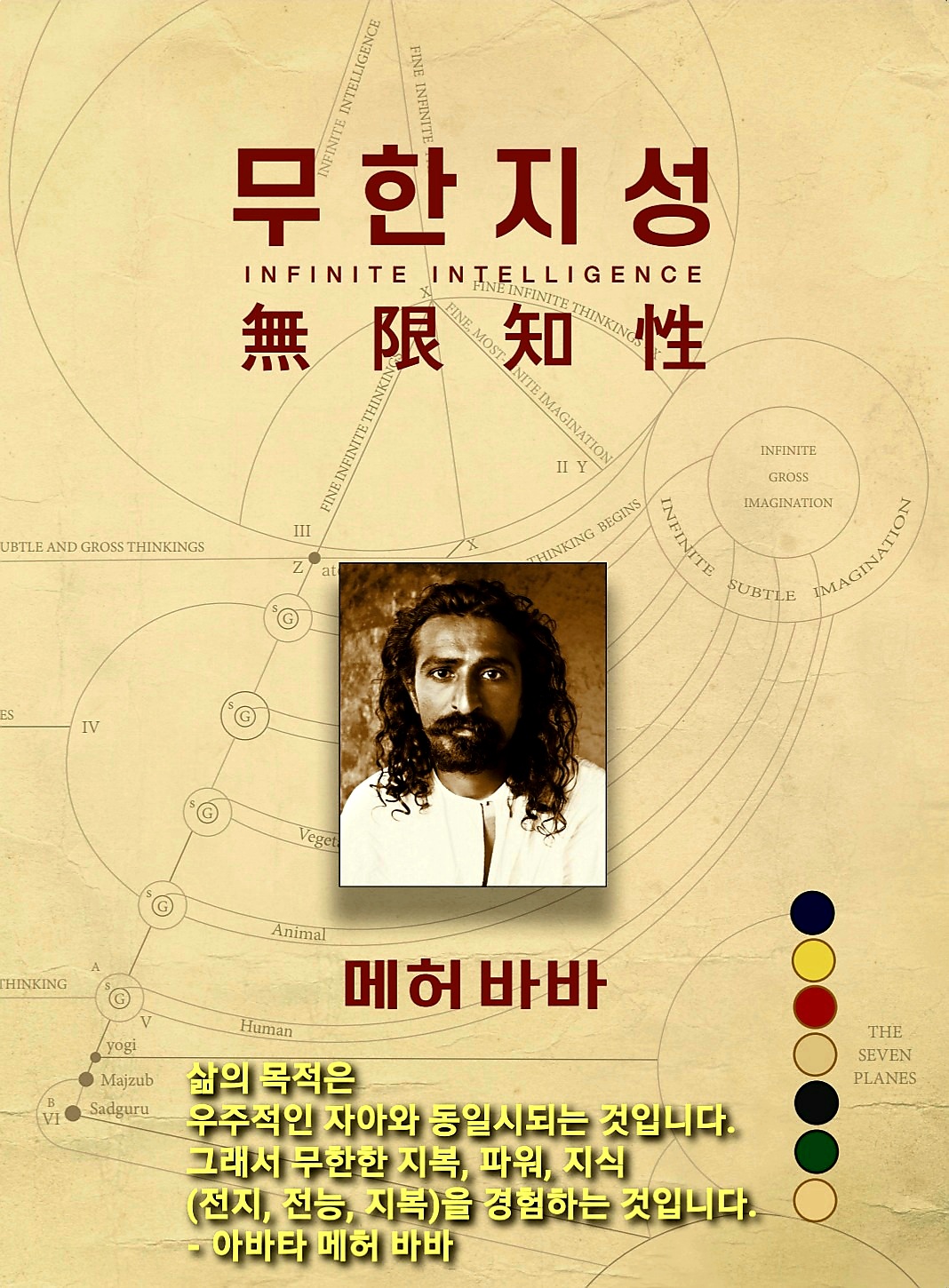
“높은 차원들의 소리를 물리적 차원의 소리로부터
진동 주파수와 강도가 다른 것으로 설명하는 실수를 피하려면,
처음 세 차원에 실제로 '소리'라고 부를 수 있는 것이 있다는 것을 확실히 알아야 합니다.
이 소리의 형태, 아름다움, 음악, 지복은 형언할 수 없습니다.
천상의 음악(사운드)은 첫 번째 차원(1경지)에 독특하며
만트라의 힘에 의해 경험되거나 유도될 수 있습니다.
이 때문에 지성 없이 반복하거나
성서(경전)을 읽는 것조차 권장되고 지지됩니다.
- 메허 바바
What Sound Is Like In The Higher Planes
Question: Can some idea be had of what sound is like from the higher planes? Does it in any way differ in intensity of frequency of vibration from the sound of the physical plane?
Answer: “This is rather difficult to explain and still more difficult to understand, as it relates to subjective experience. However, know this: that sound is present throughout all the seven planes, differing in its expression of feeling and bliss.
“The sound, sight or smell of the higher planes can by no stretch of the imagination be likened to what we are used to on the physical plane. It is something altogether different in nature, quality and expression; but all the same, for the sake of description and analogy, we can do no better than use the familiar terms, viz., sound, sight and smell. Our physical organs of hearing, seeing and smelling are useless for experiencing and enjoying the higher planes. Therein it is a different eye that sees, a different ear that hears, and a different nose that smells. You know already that there are inner senses, a counterpart of the external senses in man, and it is the former that experience the higher planes.
“Avoiding the mistake of describing the sound of the higher planes as something differing in intensity and frequency of vibrations from the sound of the physical plane, know for a certainty that there is actually what may be called ‘sound’ in the first three planes. The form, beauty, music and bliss of this sound is beyond description. The celestial music (sound) is peculiar to the first plane and can be experienced or induced by the mantric force. It is on account of this that even an unintelligent repetition or reading of scriptures is encouraged and advocated. As stated above, although there is sound in all the seven planes, it is smell that is peculiar to the second and third planes; and sight belongs to the fifth and sixth planes. In the fourth plane the bliss of sound, smell and sight are all subdued and repressed. The fourth plane connotes the darkest night of the spiritual journey, wherein even Jesus could not but cry out: ‘My God, my God, why hast Thou forsaken me?’
“It is for this reason that the wayfarer traversing the path all alone, unaided by a Master and finding himself benighted and forlorn in the fourth plane, is very strongly tempted to make wrong use of his psychic powers of the three lower planes, culminating in the fourth as ‘siddhis’ (kashf-o-karmat). And what a fall this means! It means once again going through the chain of evolution right from the beginning—the stone state.
“The seventh plane stands unique. The sound, sight and smell here is divine in essence and has no comparison to that emanating from the lower planes. In this plane one does not hear, smell or see, but actually becomes sound, smell and sight simultaneously and is divinely conscious of it.
“The different religious practices and the yogas, after establishing contact with the higher planes, induce experiences peculiar to those planes. For instance, contacting the first plane (sound) engenders inspiration; the second and third planes (smell) beget intuition; the fifth and sixth (sight) give illumination. The experience of the fifth and sixth, the Sufis term as ‘marefat’ (gnosis). The Seventh plane stands for revelation and this, according to Sufis, is haqiqat (reality).”
-Treasures from the Meher Baba Journal, p185
'메허 바바 말씀' 카테고리의 다른 글
| 이 모든 괴롭힘과 두통 - 메허 바바 (0) | 2021.12.28 |
|---|---|
| 메허 바바 명언모음 (0) | 2021.12.28 |
| 언젠가 당신은 나를 볼 것이다 - 메허 바바 (0) | 2021.12.27 |
| 순수한 사랑 - 메허 바바 (1) | 2021.12.25 |
| 당신은 메허 바바의 고통을 알아야 한다 - 메헤라 (0) | 2021.12.25 |


